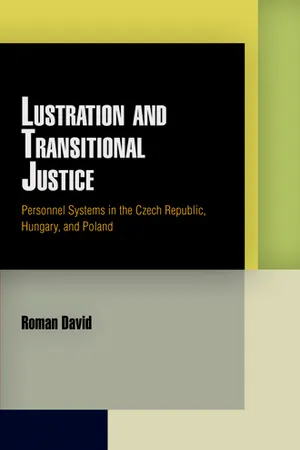
Lustration and Transitional Justice
Personnel Systems in the Czech Republic, Hungary, and Poland
- 328 pages
- English
- PDF
- Available on iOS & Android
Lustration and Transitional Justice
Personnel Systems in the Czech Republic, Hungary, and Poland
About This Book
How do transitional democracies deal with officials who have been tainted by complicity with prior governments? Should they be excluded or should they be incorporated into the new system? In Lustration and Transitional Justice, Roman David examines major institutional innovations that developed in Central Europe following the collapse of communist regimes. While the Czech Republic approved a lustration (vetting) law based on the traditional method of dismissals, Hungary and Poland devised alternative models that granted their tainted officials a second chance in exchange for truth. David classifies personnel systems as exclusive, inclusive, and reconciliatory; they are based on dismissal, exposure, and confession, respectively, and they represent three major classes of transitional justice.David argues that in addition to their immediate purposes, personnel systems carry symbolic meanings that help explain their origin and shape their effects. In their effort to purify public life, personnel systems send different ideological messages that affect trust in government and the social standing of former adversaries. Exclusive systems may establish trust at the expense of reconciliation, while inclusive and reconciliatory systems may promote both trust and reconciliation.In spite of its importance, the topic of inherited personnel has received only limited attention in research on transitional justice and democratization. Lustration and Transitional Justice is the first attempt to fill this gap. Combining insights from cultural sociology and political psychology with the analysis of original experiments, historical surveys, parliamentary debates, and interviews, the book shows how perceptions of tainted personnel affected the origin of lustration systems and how dismissal, exposure, and confession affected trust in government, reconciliation, and collective memory.
Frequently asked questions
Information
Table of contents
- Cover
- Contents
- Preface
- Abbreviations
- Introduction
- Part I. Personnel Systems and Transitional Justice Chapter 1. Personnel Systems and Their Classification
- Chapter 2. The Symbolic Meaning of Personnel Systems
- Part II. Lustration Systems in Central Europe Chapter 3. Lustration Systems and Their Operation
- Chapter 4. The Origin of Lustration Systems
- Chapter 5. The Politics of Lustration Systems
- Part III. Experimental Evidence Chapter 6. Political Effects: Trust in Government
- Chapter 7. Social Effects: Reconciliation and Collective Memory
- Conclusion
- Appendix A. The Dilemmas of Personnel Systems
- Appendix B. The Experimental Vignette
- Notes
- Selected Bibliography
- Index
- Acknowledgments